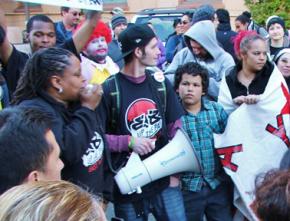Ready to raise the floor in SF
reports on the campaign for a ballot initiative to raise San Francisco's minimum wage--and attempts by business leaders and the mayor to derail it.
THE MOOD was hopeful at San Francisco City Hall on April 7 as various labor and community organizations submitted a minimum wage ballot initiative that would increase San Francisco's minimum wage to $13 an hour in January 2015, and $15 an hour for larger employers by 2016. Under the proposal, employers with fewer than 100 workers would have until 2017 to raise their minimum wage to $15 an hour.
The group spearheading the initiative--the Coalition for the Fair Economy--will now have to gather approximately 10,000 signatures by July 7 to ensure the measure is on the November ballot.
Members of the coalition include the Alliance of Californians for Community Empowerment (ACCE), Service Employees International Union Local 1021, the California Nurses Association, UNITE HERE Local 2, the Progressive Workers Alliance and San Francisco Rising.
While many members of the coalition had hopes of ensuring an initiative that made no compromise on a $15 an hour minimum wage, they finally agreed to the current measure in an effort bring on board various labor and community groups that were getting pressure from San Francisco's tech industry-backed Mayor Ed Lee to "collaborate" on a weaker measure.

The San Francisco Chamber of Commerce is already crying foul, as the announcement signaled a serious blow to Mayor Ed Lee's efforts to develop a partnership between business interests and labor and community groups to promote his own variable minimum-wage measure. In a statement released following the submission of the ballot initiative, the Chamber of Commerce said that it was "outraged by the preemptive minimum wage ballot measure."
Lee is considering an initiative that would use city funds to partly subsidize private businesses and non-profits to help pay for a higher minimum wage. Not only does this raise the obvious problems of subsidizing the wages of private interests, but those funds are currently being sought by 20 public-sector unions, whose employees are themselves in need of raises due to the skyrocketing cost of living. Lee's tactic--pitting small businesses and non-profits against public-sector employees--has the potential to undermine the interests of all low-wage workers in the city.
In addition to the eventual nearly 40 percent increase in minimum wage, the initiative would reinstate the annual cost-of-living increases already ensured in the historic minimum wage hike won in the city in 2003. It would also develop a seven-member "Employment Standards Oversight Committee," with four members appointed by the city's Board of Supervisors and three by the mayor, to ensure enforcement of the minimum wage and combat wage theft in San Francisco.
While this all but guarantees there will not be a no-compromise $15 an hour minimum wage measure on the ballot in November, winning such a substantial minimum wage increase would be an advance, especially in the face of the business-friendly "compromise" that Mayor Ed Lee and the Chamber of Commerce will put forward.
Many members of the coalition are also very active in other likely ballot measures that will hope to limit the real estate speculation and give greater rights to tenants--something overdue in the rapidly gentrifying city. This fall will undoubtedly hold the opportunity to help advance the struggle to help the working people of San Francisco.


